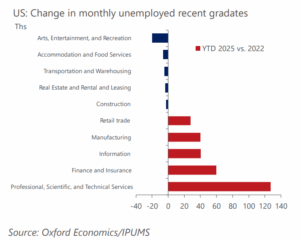
How AI Is Impacting the Job Market for College Grads

(hxdbzxy/Shutterstock)
If you’re a recent college graduate, the number of jobs available to you may be lower than you would have expected just a few years ago, thanks to adoption of AI technologies. On the other hand, we’re seeing an increase in the number of college grads with AI-related specialties as well as the number of jobs requiring AI skills, which signal reactions to changing market conditions.
From March 2024 to March 2025, the unemployment rate for recent college graduates age 22 to 27 increased from 4.6% to 5.8%, the highest reading in four years, according to national data collected by the Federal Reserve Bank of New York. “The labor market for recent college graduates deteriorated noticeably in the first quarter of 2025,” the NY Fed warned.
US Bureau of Labor Statistics had even grimmer news, finding that the unemployment rate for college graduates hit 6.6% in June 2025, the highest rate ever recorded. The national unemployment rate, by comparison, was 4.2%, according to a report by CBS News.
An increase in the labor pool of recent college graduates is one cause of this increase, according to a May report by Oxford Economics. However, that’s not the only factor at play, the research outfit said.
“While some of it is related to a normalization after the post-pandemic surge, there are signs that entry-level positions are being displaced by artificial intelligence at higher rates,” Oxford Economics said in its report.
Compared to other fields, recent college graduates in technical, scientific, and professional fields are having a harder time finding jobs in 2025 compared to 2022, with a 1.2% decrease over that time, Oxford Economics finds. Two other fields, information and finance and insurance, didn’t fare much better, with 0.4% and 0.6% decreases, respectively.
“We concluded that a high adoption rate by information companies along with the sheer employment declines in these roles since 2022 suggested some displacement effect from AI,” Oxford Economics writes. “Digging deeper, the largest displacement seems to be in entry-level jobs normally filled by recent graduates.”
The prediction that AI would displace white collar jobs isn’t new. Even before ChatGPT roared onto the scene in late 2022, experts were predicting a potential collapse in traditional employment rolls. We’re reminded of the words of Chinese AI expert Kai-Fu Lee, who in 2019 went on 60 Minutes and said: “AI will increasingly replace repetitive jobs, not just blue collar work but a lot of white collar work.”
Lee, who wrote the 2018 book “AI Super-Powers: China, Silicon Valley and the New World Order,” predicted that 40% of existing jobs would be gone within 15 years. It’s possible that generative and agentic AI may be accelerating that shift.
But it may not be all doom and gloom. As we wrote about last month, a recent PwC study found that AI is making workers more productive, with higher revenue growth per worker. The firm found that companies in industries more exposed to AI would experience job and wage growth.
Academia is also adjusting to the changing market conditions. According to an analysis by Brainly, an AI tool for students, data from the National center for Education Statistics showed that enrollment in AI-related college degree programs increased from 321,000 in 2018 to 424,000 in 2023, a 32% increase.
Related Items:
AI Makes Workers More Productive, PwC Finds
GenAI Shaking Up the Job Market, BCG Says







































